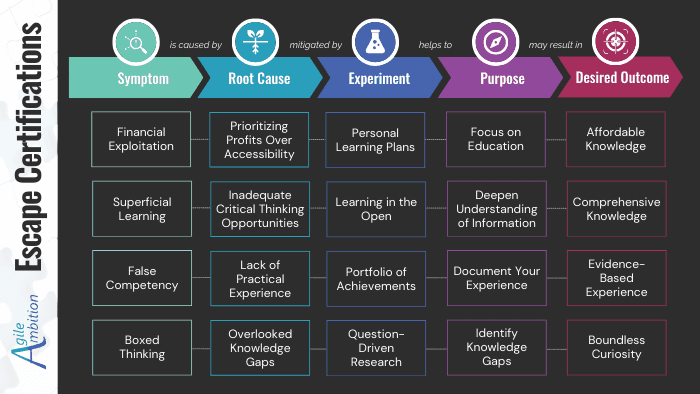Ditching the Floaties: Escape Certifications

Getting a certification is like reading a book about swimming—you might know the strokes, but you’ll sink if you’ve never been in the water.

From Financial Exploitation to Affordable Knowledge

Certification issuers base-line content for mass appeal, but lock real knowledge behind expensive paywalls. That benefits them, not you. The real value of certifications is the syllabus—it’s already structured and aligned to industry needs. Why pay thousands for that? Instead, reclaim your education. Use AI, job postings, and certification objectives to build an individualized learning plan. Focus on what you need, not what they package. With the right questions and free or affordable resources, you’ll save money, learn deeply, and leave the shallow end behind.
Personal Learning Plans empower you to take control of your expertise.
🤔 What specific skills or knowledge could you learn today that would have the most impact on your career?
From Superficial Learning to Comprehensive Knowledge

When you rely on certifications tied to a time-bound course, you only scratch the surface of what you need to learn. Most programs focus on remembering and understanding, rarely advancing to application. Opportunities for critical thinking, such as analyzing and creating, are scarce. To bridge this gap, try learning in the open. By creating content to teach others what you’re learning, you deepen your understanding and engage in the critical thinking most certifications lack. This approach leads to more comprehensive knowledge and genuine expertise, far beyond what a certificate can offer.
Learning in the open deepens understanding and turns knowledge into expertise.
🤔 How often do you apply what you’ve learned, and how could sharing it with others solidify your understanding?
From False Competency to Evidence-Based Experience

You’ve met them—the person with certifications galore who can’t seem to tie their shoes. A certificate doesn’t equal competence, yet we often treat it like a golden ticket. Your practical experience is what ultimately proves your expertise.
Seek out hands-on opportunities to apply what you’ve learned. Solve real problems. Then, document those wins. Use the STAR method (Situation, Task, Action, Result) to frame your achievements and compile them into a portfolio, ensuring you always have concrete proof of your skills ready to showcase. When you can point to tangible results, you’re not just claiming competence—you’re proving it.
A Portfolio of Achievements proves your skills and highlights real-world results.
🤔 How would you prove your expertise to others if certifications didn’t exist?
From Boxed Thinking to Boundless Curiosity

Pre-structured certifications only teach you what someone else thinks you need to know. You’ll already know some of it, and much of it won’t address the unique questions relevant to your context. Prepackaged material can’t address your unique knowledge gaps.
Every key piece of information answers a question, and every gap in your knowledge starts with one. Let your questions drive your learning. Use them to move from boxed thinking to boundless curiosity.
Question-driven research helps you tailor your learning journey.
🤔 What questions about your field do you wish you had answers to, and how could you start exploring them now?
TL;DR
Certifications offer the strokes, but real expertise requires getting in the water. Ditch the floaties, ask questions, and dive into deeper learning.

Choose one experiment to explore over the next month. Your growth will speak for itself.
Share
Table Of Contents
Fuel an Idea
Every week, I break down complex ideas, strip away the fluff, and give you experiments to turn knowledge into skills.
If that’s worth a coffee, consider fueling the next big insight.
No pressure. No guilt trips. Just impact.
Buy Me a CoffeeRelated Posts
Quick Links
Legal Stuff

